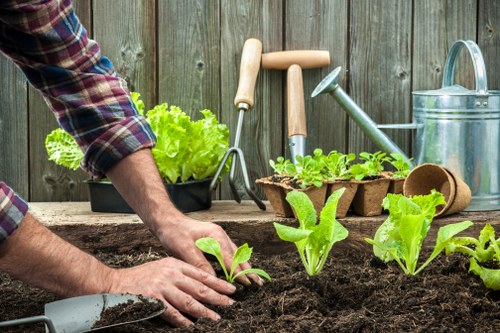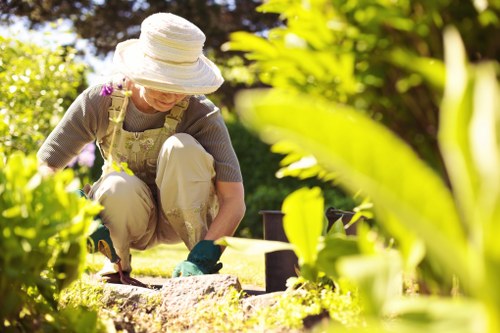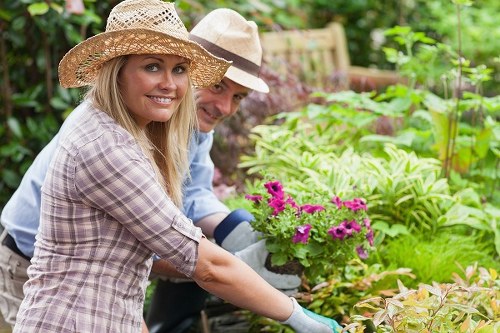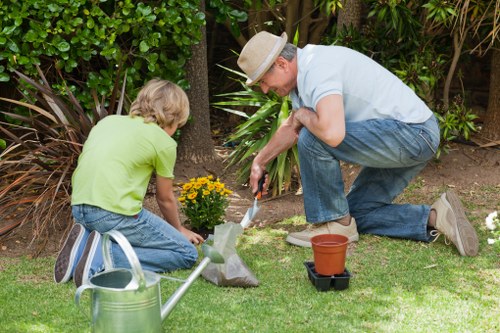Garden Maintenance in Eltham

Introduction to Garden Maintenance
Welcome to the ultimate guide on garden maintenance in Eltham. Whether you're a seasoned gardener or a beginner, maintaining a beautiful garden requires dedication, knowledge, and the right tools. In Eltham, where the climate and soil conditions are unique, understanding the specifics of garden care is essential for thriving plants and vibrant landscapes.
Eltham's lush greenery and well-kept gardens make it a desirable place to live. Proper maintenance not only enhances the aesthetic appeal of your property but also contributes to the overall health of your plants. From seasonal planting to regular upkeep, garden maintenance encompasses a variety of tasks that ensure your outdoor space remains a sanctuary throughout the year.
In this comprehensive article, we will explore the best practices for garden maintenance in Eltham, covering everything from soil preparation to pest control. Whether you're looking to revamp your garden or simply keep it in top shape, our tips and strategies will help you achieve the garden of your dreams.

Understanding Eltham’s Climate and Soil
Eltham enjoys a temperate climate, characterized by mild winters and warm summers. This climate is conducive to a wide range of plants, but it also presents specific challenges that gardeners must address. Understanding the local weather patterns is crucial for planning your garden maintenance activities throughout the year.
The soil in Eltham varies from sandy to clayey, impacting water drainage and nutrient availability. Conducting a soil test can provide valuable insights into the pH levels and nutrient content, allowing you to amend the soil accordingly. Healthy soil is the foundation of a thriving garden, supporting strong plant growth and resilience against pests and diseases.
Mulching is an effective technique to improve soil quality, retain moisture, and suppress weeds. Organic mulches, such as bark or compost, gradually break down to enrich the soil, enhancing its structure and fertility. Regularly adding mulch is a simple yet impactful step in your garden maintenance routine.

Seasonal Garden Maintenance Tasks
Spring Maintenance
Spring is a pivotal time for garden maintenance in Eltham. As the weather warms, it's the perfect opportunity to prepare your garden for the growing season. Start by clearing any debris left from the winter months, including fallen leaves and dead branches.
Planting new flowers, shrubs, and trees can add fresh life to your garden. Choose native or well-suited varieties that thrive in Eltham's climate. Additionally, pruning is essential in spring to remove any damaged or overgrown branches, promoting healthy growth.
Fertilizing your plants in the spring provides them with the necessary nutrients to support robust development. It's important to select the right type of fertilizer based on your soil test results to avoid overfeeding or nutrient deficiencies.

Summer Maintenance
Summer brings the hottest months, requiring diligent garden maintenance to ensure plants remain healthy. Regular watering is crucial, especially during dry spells. Drip irrigation systems can provide efficient and consistent moisture to your garden.
Weed control becomes a priority in the summer to prevent unwanted plants from competing with your garden's desirable species. Hand-pulling or using eco-friendly herbicides can help manage weed growth without harming the environment.
Pest management is also vital during the summer. Monitor your plants for signs of pests and diseases, and address any issues promptly using organic or chemical treatments as needed. Maintaining good garden hygiene can reduce the likelihood of infestations.

Autumn Maintenance
As temperatures begin to cool, autumn is the time to prepare your garden for the upcoming winter. This involves clearing spent plants, deadheading flowers, and composting garden waste to enrich your soil for next year.
Planting bulbs in the autumn ensures vibrant blooms in the spring. It's also an ideal time to mulch your garden beds, providing insulation against frost and helping to protect plant roots during the colder months.
Final pruning in autumn removes any remaining dead or damaged branches, reducing the risk of disease and promoting structural stability for winter. Proper autumn maintenance sets the stage for a flourishing garden in the following year.
Essential Tools for Garden Maintenance
Having the right tools is fundamental to effective garden maintenance. Investing in high-quality equipment can make tasks easier and more efficient, ensuring your garden receives the best possible care.
- Pruning Shears: Essential for trimming branches and shaping plants.
- Garden Fork: Ideal for aerating soil and turning compost.
- Rake: Useful for clearing debris and leveling soil.
- Hose with Adjustable Nozzle: Provides versatile watering options for different plant needs.
- Wheelbarrow: Facilitates the transportation of soil, mulch, and garden waste.
Proper Tool Maintenance
Maintaining your garden tools is just as important as using them. Clean tools after each use to prevent rust and corrosion, and regularly sharpen blades to ensure precise cuts. Storing tools in a dry, sheltered area extends their lifespan and keeps them in optimal condition.
Safety Tips
Always prioritize safety when handling garden tools. Wear appropriate protective gear, such as gloves and goggles, to prevent injuries. Follow manufacturer instructions for tool use and maintenance to ensure safe and effective operation.
Professional Garden Maintenance Services in Eltham
For those who prefer to leave garden maintenance to the experts, numerous professional services are available in Eltham. Hiring a professional gardener can save you time and ensure that your garden receives specialized care tailored to its unique needs.
Professional services typically include regular lawn mowing, pruning, planting, pest control, and seasonal clean-ups. Additionally, they can offer personalized advice on plant selection and garden design, helping you create a cohesive and beautiful outdoor space.
When selecting a garden maintenance service in Eltham, consider factors such as experience, reputation, and the range of services offered. Reading reviews and asking for recommendations can help you find a reliable and skilled provider who meets your specific requirements.
Cost of Garden Maintenance in Eltham
The cost of garden maintenance in Eltham varies based on the size of your garden, the services required, and the frequency of maintenance. On average, homeowners can expect to pay between $100 and $300 per month for comprehensive garden care.
Factors influencing the cost include the complexity of the garden, the types of plants and trees, and any additional services such as landscaping or irrigation system installation. It's important to obtain quotes from multiple providers to ensure you receive competitive pricing and value for money.
Investing in regular garden maintenance not only enhances the beauty of your property but also increases its overall value. A well-maintained garden can make a significant difference in curb appeal and contribute to a pleasant outdoor living experience.
Budgeting for Garden Maintenance
Creating a budget for garden maintenance involves assessing your garden's needs and prioritizing tasks. Consider allocating funds for essential services, such as weekly lawn mowing and seasonal clean-ups, while also setting aside a portion for unexpected expenses like pest control or emergency repairs.
By planning ahead and managing your budget effectively, you can ensure that your garden remains in excellent condition without overspending. Regular maintenance also helps prevent costly repairs or extensive overhauls in the future.
Cost-Saving Tips
- DIY Maintenance: Handle simple tasks like weeding and watering yourself to reduce costs.
- Seasonal Planting: Choose plants that thrive in Eltham’s climate to minimize the need for extensive care.
- Reuse and Recycle: Utilize compost and mulch to enhance soil quality naturally.
- Regular Inspections: Identify and address issues early to avoid expensive treatments later.
10-15 Closest Areas to Eltham for Garden Maintenance
Eltham is surrounded by several charming neighborhoods and suburbs, each offering unique features and accessibility to professional garden maintenance services. Here are some of the closest areas to Eltham that benefit from excellent gardening support:
- Lower Plenty: Just west of Eltham, known for its scenic parks and riverfront gardens.
- Kew East: Offers a mix of residential and green spaces, perfect for garden enthusiasts.
- Bulleen: Renowned for its well-maintained homes and lush landscapes.
- Templestowe: Features expansive gardens and mature trees, ideal for high-end garden maintenance.
- Montmorency: Known for its vibrant community and diverse plant life.
- Doncaster East: A bustling suburb with numerous gardening services available.
- Templestowe Lower: Offers beautiful garden settings and professional maintenance options.
- Park Orchards: Combines residential comfort with excellent garden care facilities.
- Bass Hill: A peaceful area with a focus on sustainable garden practices.
- Lilydale: Slightly further out, but provides top-tier garden maintenance services.
- Wattle Glen: Known for its community gardens and active gardening clubs.
- Rosanna: Offers modern garden solutions and innovative maintenance techniques.
- La Trobe University: The surrounding area benefits from educational insights into advanced gardening methods.
- Greensborough: Features a variety of plant species and specialized garden care.
- Heathmont: Combines suburban living with extensive gardening services.
Choosing the Right Plants for Eltham Gardens
Selecting the appropriate plants is crucial for a thriving garden in Eltham. Consider factors such as climate, soil type, and sunlight exposure when choosing your plant varieties. Native plants are often the best choice, as they are adapted to the local environment and require less maintenance.
Some popular choices for Eltham gardens include:
- Roses: Classic and versatile, roses add color and fragrance to any garden.
- Lavender: Known for its aromatic properties and drought resistance.
- Hostas: Ideal for shaded areas, providing lush foliage and vibrant flowers.
- Japanese Maple: Offers stunning foliage and architectural beauty.
- Succulents: Low-maintenance and perfect for modern garden designs.
Incorporating a mix of perennials, annuals, shrubs, and trees can create a dynamic and visually appealing garden. Additionally, consider integrating edible plants such as herbs and vegetables to combine aesthetics with functionality.
Water-Wise Gardening
Water conservation is increasingly important, and water-wise gardening practices can help reduce your garden's water usage. Implementing techniques like mulching, xeriscaping, and installing efficient irrigation systems can significantly decrease water waste.
Choose drought-tolerant plants that require minimal watering and provide aesthetic value. Grouping plants with similar water needs together allows for more efficient irrigation and maintenance.
Organic Gardening
Organic gardening promotes environmental sustainability and healthier plant growth by avoiding synthetic fertilizers and pesticides. Instead, rely on natural methods such as composting, biological pest control, and organic mulches.
Maintaining soil health through organic practices enhances plant resilience and reduces the likelihood of disease and pest infestations. Additionally, organic gardens contribute to biodiversity, supporting beneficial insects and wildlife.
Lawn Care and Maintenance
A well-maintained lawn is a cornerstone of any beautiful garden. Proper lawn care involves regular mowing, fertilizing, aerating, and managing weeds and pests. In Eltham, the climate supports a variety of grass types, each with its own maintenance requirements.
- Mowing: Regular mowing encourages dense growth and prevents weeds from taking hold. Aim to mow your lawn when the grass is dry for a cleaner cut.
- Fertilizing: Provide your lawn with essential nutrients during the growing season to promote healthy and vigorous grass.
- Aeration: Aerating your lawn helps improve water and nutrient absorption, reducing soil compaction.
- Weed Control: Use selective herbicides or manual removal to manage unwanted weeds without harming your grass.
Integrated Pest Management (IPM)
Integrated Pest Management is a sustainable approach to controlling lawn and garden pests. It combines biological, cultural, mechanical, and chemical methods to manage pest populations effectively while minimizing environmental impact.
Regular monitoring and early intervention are key components of IPM. By maintaining healthy plants and encouraging natural predators, you can reduce the reliance on chemical pesticides and promote a balanced ecosystem in your garden.
Soil Health
Maintaining healthy soil is fundamental for a thriving lawn and garden. Regularly testing your soil can help you understand its composition and nutrient levels, allowing for targeted amendments.
Incorporating organic matter such as compost or well-rotted manure improves soil structure, enhances fertility, and promotes beneficial microbial activity. Healthy soil supports robust plant growth and reduces susceptibility to pests and diseases.
Pruning and Trimming Tips
Pruning and trimming are essential tasks in garden maintenance, helping to shape plants, promote growth, and prevent diseases. Proper pruning techniques vary depending on the type of plant and the desired outcome.
- Timing: Prune at the appropriate time of year for each plant species to avoid damaging new growth.
- Tools: Use sharp, clean tools to make precise cuts and reduce the risk of infection.
- Technique: Remove dead or diseased branches first, followed by any crossing or overcrowded limbs.
- Maintenance: Regularly trim back overgrown plants to maintain their shape and size.
Incorporating pruning into your regular garden maintenance routine helps ensure that your plants remain healthy, aesthetically pleasing, and productive.
Specialized Pruning for Trees and Shrubs
Trees and shrubs require specialized pruning techniques to support their structure and longevity. Light pruning can encourage new growth, while more extensive pruning may be necessary to remove large branches or correct structural issues.
For young trees, establishing a strong framework through proper pruning is crucial. For mature trees, focus on removing any hazardous or diseased limbs to maintain safety and health.
Flower and Vegetable Garden Pruning
Pruning is not limited to trees and shrubs; flower and vegetable gardens also benefit from regular trimming. Deadheading spent blooms promotes continuous flowering, while pruning vegetable plants can enhance air circulation and light penetration, leading to better yields.
Carefully trimming your flower and vegetable plants ensures they remain productive and visually appealing throughout the growing season.
Mulching and Composting
Mulching and composting are integral components of sustainable garden maintenance. These practices improve soil health, conserve moisture, and reduce the need for chemical fertilizers.
- Mulching: Apply a layer of organic mulch around your plants to regulate soil temperature, retain moisture, and suppress weed growth.
- Composting: Create your own compost by recycling kitchen scraps and garden waste. Compost enriches the soil with essential nutrients and improves its structure.
- Benefits: Both mulching and composting contribute to a healthier garden ecosystem, supporting plant growth and resilience.
Types of Mulch
There are various types of mulch available, each with its own benefits. Organic mulches, such as wood chips, straw, and leaves, gradually decompose, adding nutrients to the soil. Inorganic mulches, like gravel or rubber, provide long-lasting coverage without adding nutrients but may require less frequent replenishment.
Composting Techniques
Effective composting involves balancing green and brown materials, maintaining proper moisture levels, and turning the compost pile regularly to aerate it. A well-managed compost pile accelerates decomposition and produces rich, dark compost that enhances soil fertility.
Using Compost in Your Garden
Incorporate compost into your garden beds by mixing it with the existing soil. This practice improves soil structure, increases water retention, and provides a slow-release source of nutrients for your plants.
Irrigation Systems and Water Management
Efficient irrigation is crucial for maintaining a healthy garden, especially during the hot summer months in Eltham. Selecting the right irrigation system can save water, reduce labor, and ensure your plants receive the optimal amount of moisture.
- Drip Irrigation: Delivers water directly to the plant roots, minimizing evaporation and waste.
- Sprinkler Systems: Ideal for covering large areas, but may require careful scheduling to avoid overwatering.
- Soaker Hoses: Provide a gentle, even distribution of water, suitable for vegetable gardens and flower beds.
- Rainwater Harvesting: Collecting and storing rainwater can provide a sustainable water source for your garden.
Smart Irrigation Solutions
Modern irrigation systems can be equipped with smart technology, allowing for automated scheduling and remote control via smartphone apps. These systems can adjust watering patterns based on weather conditions, ensuring efficient water usage and reducing the risk of over or underwatering.
Water Conservation Tips
Implementing water conservation practices can significantly reduce your garden's water footprint. Some effective strategies include:
- Using mulch to retain soil moisture.
- Group plants with similar water needs together.
- Watering early in the morning or late in the evening to minimize evaporation.
- Collecting rainwater for garden use.
- Opting for drought-tolerant plant varieties.
Enhancing Garden Aesthetics
Creating a visually appealing garden involves thoughtful design and attention to detail. Incorporate elements such as color coordination, plant variety, and structural features to enhance the overall look of your garden.
- Color Schemes: Choose a harmonious color palette that complements your home's exterior and creates a cohesive look throughout your garden.
- Plant Variety: Mix different plant types, sizes, and textures to add depth and interest to your garden space.
- Structural Features: Incorporate pathways, garden beds, and focal points like fountains or sculptures to guide the eye and add character.
Creating Garden Zones
Dividing your garden into distinct zones can help organize spaces for different purposes, such as relaxation, dining, or play. Each zone can feature specific plants and design elements that cater to its intended use, creating a functional and aesthetically pleasing outdoor environment.
Lighting and Fixtures
Outdoor lighting enhances the beauty of your garden after dark and extends its usability into the evening hours. Install lights along pathways, highlight key features, and incorporate ambient lighting to create a warm and inviting atmosphere.
Decorative Elements
Adding decorative elements like garden art, benches, and birdbaths can personalize your garden and make it a more enjoyable space. These features can also serve as focal points, drawing attention to specific areas and enhancing the overall aesthetic appeal.
Sustainable Garden Practices
Adopting sustainable gardening practices contributes to environmental conservation and promotes a healthy ecosystem in your garden. Sustainable methods focus on reducing waste, conserving resources, and supporting biodiversity.
- Composting: Recycle organic waste to create nutrient-rich compost, reducing landfill waste and improving soil health.
- Rainwater Harvesting: Collect and utilize rainwater for irrigation, conserving water and reducing reliance on municipal sources.
- Native Plants: Choose native species that require less water and are more resistant to local pests and diseases.
- Organic Pest Control: Use natural predators and organic treatments to manage pests without harming beneficial insects.
- Energy-Efficient Lighting: Install solar-powered lights to reduce energy consumption and minimize your garden's carbon footprint.
Pollinator-Friendly Gardens
Creating a pollinator-friendly garden supports essential insects like bees, butterflies, and birds. Incorporate plants that provide nectar and habitat for pollinators, enhancing biodiversity and promoting healthy plant reproduction.
Reducing Chemical Usage
Avoiding the use of synthetic fertilizers and pesticides helps maintain a balanced and healthy garden ecosystem. Opt for organic alternatives and natural methods to support plant growth and manage pests.
Recycling and Upcycling
Implementing recycling and upcycling practices in your garden reduces waste and promotes sustainability. Reuse materials such as containers, tools, and garden structures to minimize environmental impact and add unique character to your garden space.
Common Garden Pests and Solutions
Maintaining a healthy garden involves managing various pests that can damage plants and disrupt the ecosystem. Understanding common garden pests in Eltham and implementing effective control measures is essential for successful garden maintenance.
- Aphids: Small insects that suck plant sap, causing stunted growth and distorted leaves.
- Slugs and Snails: Mollusks that feed on a wide range of plants, leaving unsightly holes and trails.
- Whiteflies: Tiny white insects that infest foliage, leading to weakened plants and reduced productivity.
- Spider Mites: Microscopic pests that cause yellowing and speckling of leaves.
- Caterpillars: Larval stage of butterflies and moths that can defoliate plants rapidly.
Natural Pest Control Methods
Implementing natural pest control methods helps maintain a balanced garden ecosystem without relying on harmful chemicals. Some effective techniques include:
- Biological Control: Introduce beneficial insects like ladybugs and predatory beetles that feed on pests.
- Companion Planting: Grow plants that repel pests or attract beneficial insects alongside your main crops.
- Mechanical Control: Use barriers, traps, and manual removal to manage pest populations.
Chemical Pest Control
When natural methods are insufficient, selective use of chemical pesticides may be necessary. It's important to choose pesticides that target specific pests to minimize harm to beneficial insects and the environment.
Always follow the manufacturer's instructions and apply pesticides carefully to prevent overuse and reduce the risk of resistance development in pests.
Creating a Wildlife-Friendly Garden
A wildlife-friendly garden invites beneficial creatures such as birds, bees, and butterflies to thrive, enhancing the biodiversity and health of your garden. Incorporating features that support wildlife can create a vibrant and dynamic outdoor space.
- Birdhouses and Feeders: Attract birds that help control insect populations and contribute to pollination.
- Butterfly Gardens: Plant nectar-rich flowers to support butterfly species and other pollinators.
- Water Sources: Install birdbaths or small ponds to provide drinking and bathing water for wildlife.
- Native Plants: Choose plants that offer habitat and food sources for local wildlife.
- Insect Hotels: Provide shelter for beneficial insects like solitary bees and ladybugs.
Creating Habitats
Design your garden to include a variety of habitats, such as sunny flower beds, shady woodlands, and moist areas near water sources. Diverse habitats support different species, promoting a balanced and resilient garden ecosystem.
Sustainable Practices for Wildlife
Adopt sustainable gardening practices to ensure that your garden remains a safe and supportive environment for wildlife. Avoid using pesticides that harm beneficial species, and provide continuous food and shelter sources throughout the year.
Benefits of a Wildlife-Friendly Garden
Creating a wildlife-friendly garden enhances the natural beauty of your outdoor space and provides numerous ecological benefits. Wildlife contributes to pollination, pest control, and soil health, supporting the overall vitality of your garden.
Conclusion
Effective garden maintenance in Eltham combines knowledge of local climate and soil conditions with best practices in planting, pruning, watering, and pest control. By implementing the strategies outlined in this guide, you can create and maintain a beautiful, thriving garden that enhances your property and provides a serene outdoor retreat.
Whether you choose to manage your garden yourself or hire professional services, consistent care and attention are key to achieving long-lasting results. Embrace sustainable practices, invest in the right tools, and stay informed about the latest gardening techniques to ensure your Eltham garden remains a source of pride and joy for years to come.
Ready to transform your garden? Contact us today to book your garden maintenance service and take the first step towards a lush and vibrant outdoor space.
Get In Touch
Please fill out the form below to send us an email and we will get back to you as soon as possible.
Telephone:
Opening Hours: Monday to Sunday, 00:00-24:00
Website: allansgardeners.com
Description:
Affordable, expert gardening services for your home or business. Lawn care, design, and maintenance across Australia.
Copyright © Allans Gardeners. All Rights Reserved.
